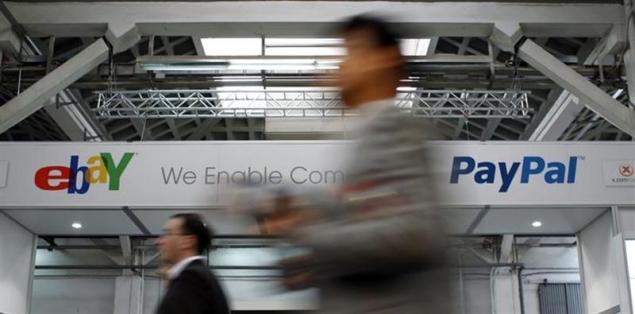- Home
- Internet
- Internet News
- eBay hit as 'gloves come off' over PayPal digital wallet fee
eBay hit as 'gloves come off' over PayPal digital wallet fee

MasterCard Inc, one of the largest payment networks, said earlier this year that it plans a new fee for digital wallet operators like PayPal starting in June.
The actual dollar amount PayPal ends up paying may not be that large, analysts say. However, they are worried that this is part of a broader move by payment networks to target PayPal, which has become more of a direct competitor recently.
"Payment networks are taking the gloves off," Bill Carcache and Brian Nowak, analysts at Nomura Equity Research, wrote in a note to investors on Monday. "The incumbents will do everything in their power to prevent PayPal from riding on their rails without extracting a toll."
EBay shares slid 0.5 percent to $50.18, on Monday afternoon, leaving them down about 4 percent so far this year.
Since eBay mentioned the MasterCard fee in a regulatory filing on February 1, the company has lost about 12 percent of its market value - while Amazon is down about 1 percent and the Nasdaq Composite is up 2 percent.
Analysts put that under-performance down to this new fee and concern about rising tension between PayPal and the payment networks.
"The fact that PayPal, as the largest digital wallet player, could be singled out by a network like this is clearly a negative," said Ken Sena, an analyst at Evercore Partners.
PayPal is moving from its online roots into the physical retailer world, where the vast majority of payments still take place. It is a big opportunity for the business and that has driven eBay shares higher in the past year.
However, as a payment option in lots of physical stores, PayPal will be a much bigger threat to network operators like MasterCard, Visa Inc and American Express, analysts say.
Historically, Visa and MasterCard viewed PayPal's success in the online world cautiously, but they were also happy because the service generated extra e-commerce transactions that ultimately got processed through their networks.
"Now that PayPal has started moving to the physical point of sale, however, competitive intensity levels are rising as PayPal encroaches deeper into what has traditionally been the incumbents' turf," Nomura's Carcache and Nowak said.
At a conference last month, Chris McWilton, president of MasterCard's U.S. Markets, complained that PayPal "rides for free" on other companies' business models.
"They've got to be cautious that they don't get too big and start making people wake up and say wait a minute, I'm actually losing business here because of your moving into the physical space," he added.
The MasterCard fee will be charged on "staged" digital wallets, such as PayPal, Google's Wallet, Square, iZettle in Europe and Intuit's GoPayment, according to analysts.
Staged digital wallets share less information with card issuers and the networks, creating customer service problems and making it more difficult to deal with card rewards programs, Carcache and Nowak explained.
MasterCard may be doing this to encourage PayPal and other staged digital wallet operators to share more valuable information about where transactions take place and with which merchants, Evercore's Sena said.
Sena and other analysts are concerned that Visa and other networks will create similar digital wallet fees.
A Visa spokesman declined to comment on Monday.
If all payment networks assess such fees, but they are limited to transactions in the United States and exclude payments on eBay's marketplace, that could shave about two cents a share off eBay's annual profit, Sanjay Sakhrani, an analyst at Keefe, Bruyette & Woods, estimated recently.
© Thomson Reuters 2013
Get your daily dose of tech news, reviews, and insights, in under 80 characters on Gadgets 360 Turbo. Connect with fellow tech lovers on our Forum. Follow us on X, Facebook, WhatsApp, Threads and Google News for instant updates. Catch all the action on our YouTube channel.
Related Stories
- Samsung Galaxy Unpacked 2026
- iPhone 17 Pro Max
- ChatGPT
- iOS 26
- Laptop Under 50000
- Smartwatch Under 10000
- Apple Vision Pro
- Oneplus 12
- OnePlus Nord CE 3 Lite 5G
- iPhone 13
- Xiaomi 14 Pro
- Oppo Find N3
- Tecno Spark Go (2023)
- Realme V30
- Best Phones Under 25000
- Samsung Galaxy S24 Series
- Cryptocurrency
- iQoo 12
- Samsung Galaxy S24 Ultra
- Giottus
- Samsung Galaxy Z Flip 5
- Apple 'Scary Fast'
- Housefull 5
- GoPro Hero 12 Black Review
- Invincible Season 2
- JioGlass
- HD Ready TV
- Latest Mobile Phones
- Compare Phones
- Tecno Pova Curve 2 5G
- Lava Yuva Star 3
- Honor X6d
- OPPO K14x 5G
- Samsung Galaxy F70e 5G
- iQOO 15 Ultra
- OPPO A6v 5G
- OPPO A6i+ 5G
- Asus Vivobook 16 (M1605NAQ)
- Asus Vivobook 15 (2026)
- Brave Ark 2-in-1
- Black Shark Gaming Tablet
- boAt Chrome Iris
- HMD Watch P1
- Haier H5E Series
- Acerpure Nitro Z Series 100-inch QLED TV
- Asus ROG Ally
- Nintendo Switch Lite
- Haier 1.6 Ton 5 Star Inverter Split AC (HSU19G-MZAID5BN-INV)
- Haier 1.6 Ton 5 Star Inverter Split AC (HSU19G-MZAIM5BN-INV)





![[Partner Content] OPPO Reno15 Series: AI Portrait Camera, Popout and First Compact Reno](https://www.gadgets360.com/static/mobile/images/spacer.png)









